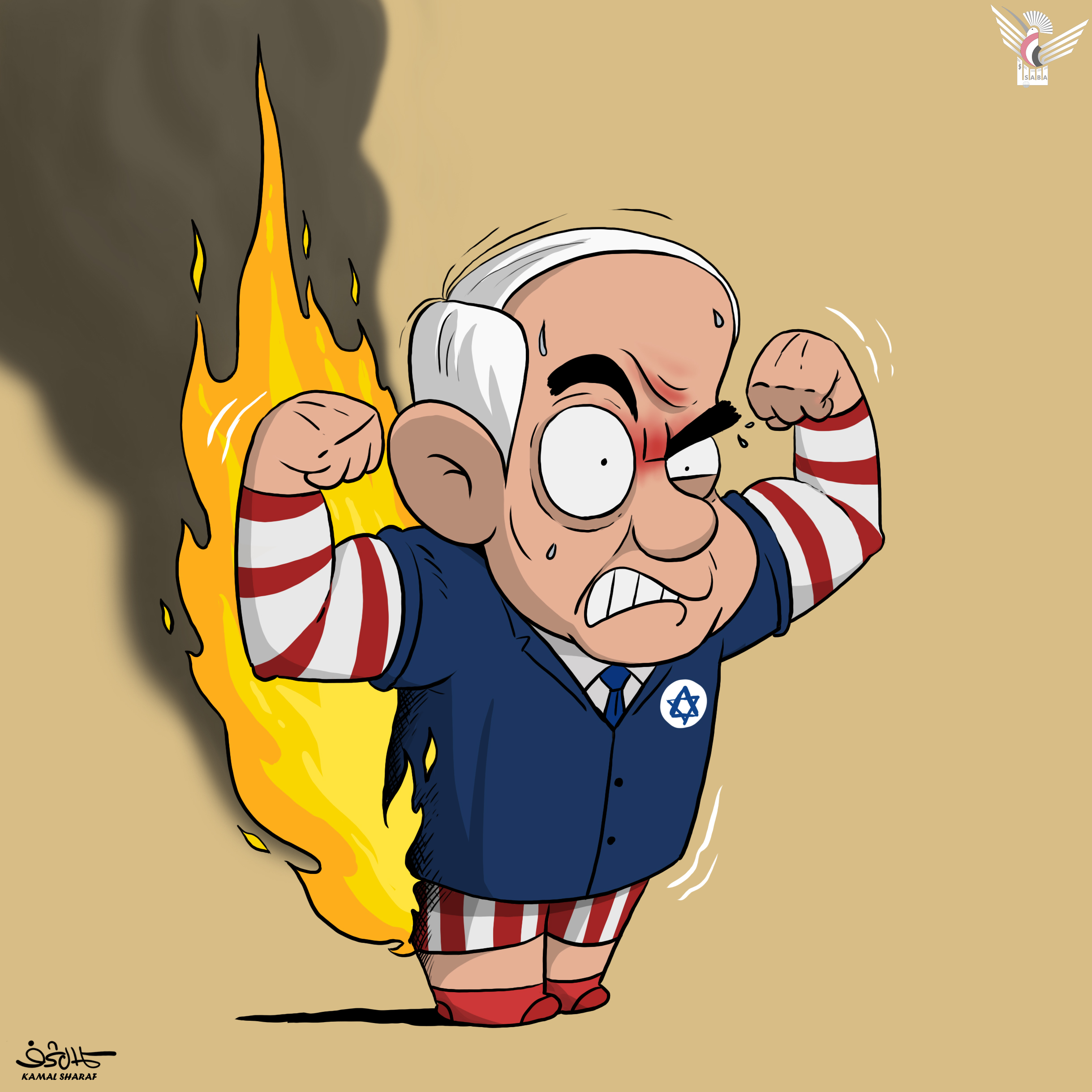SANA'A August 13. 2024 (Saba) -The brutal Zionist war of aggression on Gaza cast its shadow on the decline of the United States' position in the Middle East, and the great risks to its interests in the region, while in contrast, the status of China is growing, which follows a "balanced" foreign policy towards crises in the region.
China follows a policy of distancing itself from the sharp conflicts in the region, and replaces that with positions calling for reducing tensions and bridging the gap between the parties.
The continuation of the aggression on Gaza, in light of the shameful international silence and the capitals of several countries in the region, many researchers are wondering how the American position in the Middle East will be affected? Is Washington trying to revive its diplomatic role in the Middle East?
Before the "Al-Aqsa Flood" on October 7, and over the years, many questions have been raised about the role of the United States in the Middle East and the future of its cooperation with Arab countries, especially after focusing its diplomacy on what it describes as the "Chinese threat" in the Pacific Ocean, and its involvement in supporting the Ukrainian war efforts.
After coming to power, Biden participated in a regional summit in Jeddah in July 2022, which brought together the leaders of the Gulf states, Egypt, Jordan and Iraq, during which he tried to send a message that the United States still supports and is allied with the Arab countries.
During the summit, which coincided with his first visit to the region, Biden affirmed his country's commitment to the role it plays, saying: "We have witnessed tremendous changes here in the Middle East (...), we declare clearly that the United States will remain an active and committed partner in the Middle East."
On October 8, the US President, on a visit to the occupied Palestinian territories in 1948, actually demonstrated the true role of the US-Zionist partnership when he affirmed Washington's absolute support for "Tel Aviv", saying at the time: "Israel was born to be a safe place for the Jewish people in the world... If it does not exist, we will have to invent it... It must once again be a safe place for the Jewish people." With these words, the truth became clear to the entire world with its complete bias towards the Zionist entity, but it was absent from the Arab countries.
However, with US statements of interest in the Middle East region, there were no real moves on the ground to help reduce the intensity of tension in the crises of the countries of the region in particular.
In contrast, in March 2023, Chinese mediation succeeded in one of the most complex political disputes between Saudi Arabia and Iran, as the two countries announced the resumption of their diplomatic relations.
Chinese Foreign Minister Wang Yi considered the agreement a "victory for dialogue and a victory for peace", stressing in an implicit message to the United States that Beijing "will continue to play a constructive role in dealing with thorny issues in the world, and will demonstrate its responsibility as a major country".
Chinese diplomacy also sought to bring together Palestinian factions in the capital, Beijing, and the meeting last July resulted in a new Palestinian reconciliation agreement signed by 14 factions in Beijing under the auspices of the host country. This is the 13th agreement to be announced between the Fatah and Hamas movements with the participation of the PLO factions.
The agreement came in light of the Zionist aggression that has reached its peak in a genocidal war in the Gaza Strip since October 7, in addition to the deterioration of the security and political situation in the West Bank and occupied Jerusalem.
Many experts and analysts believe that the American role is actually declining in the Middle East region, paving the way for the rise of more effective diplomacy by other countries, such as China.
The events in Gaza brought the Middle East file back to the forefront in Washington, as the file, along with the Palestinian issue, is one of the most important pending issues in the world, and enjoys special American interest.
However, the diplomatic tours of US Secretary of State Anthony Blinken at the beginning of the aggression and then the visit of the US President, proved beyond doubt that the United States, with its successive administrations, always completely and blatantly sides with the usurping Zionist entity.
US diplomacy has begun meetings with regional powers, such as Turkey, Qatar and Egypt, to achieve a truce between the conflicting parties and exchange views on the file. However, it has become clear that the US policy of appeasement and evasion has not yet achieved any breakthrough in completing the deal, ceasefire and prisoner exchange between Hamas and the Zionist entity.
Rather, it made matters worse by supporting the Zionist entity with lethal weapons and thousand-pound bombs, and obstructing any ceasefire project in the Security Council, as it turned a blind eye to the crimes of the Zionist entity government and its persistence in assassinating resistance leaders in Lebanon, assassinating Hamas leader Ismail Haniyeh in Tehran, and attacking the port of Hodeida in Yemen, so that the escalation reached its peak in the region, and Iran, Yemen, and Lebanon pledged to respond.
Instead of forcing and pressuring the Zionist entity to stop the aggression, Washington sent warships and aircraft carriers to the seas of the region to defend the usurping Zionist entity and to increase the escalation process in the region even more with these steps.
Thus, Washington appeared in its clear reality that it does not want to stop the aggression on Gaza and does not want to reduce the escalation in the region, through its support for the Zionist entity in its aggression against the countries of the region and its support for the usurping entity with weapons, equipment, money, diplomatically, economically, and in the media, and by mobilizing its naval forces and moving its bases so that the Zionist enemy can continue its massacres, genocide, and destruction in Gaza and continue its aggression against the countries of the region.
Thus, it has become clear to everyone that the remarkable American diplomatic interaction that is happening today is because the Al-Aqsa Flood operation on October 7th made the Americans rush to intervene forcefully to support their ally, the Zionist entity, and to send a very clear message, which is that anyone who harms the Zionist entity harms the United States. According to analysts, the American presence strengthens everything that serves the Zionist enemy, as a result of pressures and trends within Washington, embodied through American collusion and the White House’s partnership in the massacres committed by the Zionist entity in Gaza.
However, despite the equipment, forces and aircraft prepared by the Zionist enemy, the Palestinian resistance, after the aggression reached its tenth month, is still able to confront the enemy’s army and teach it lessons it was not accustomed to before in military tactics and in the bravery of the resistance fighters who pound the enemy’s soldiers with rockets and mortar shells, set up tight ambushes and booby-trapped tunnels and homes with Zionist soldiers in them.
In addition to that, it supports the support fronts alongside the resistance in Yemen, Lebanon, Syria, Iraq and Iran, which supports the Palestinian resistance.
All the manipulation and evasion practiced by the current American administration regarding pressure on the Zionist entity to stop the brutal war on the Gaza Strip, this administration is making strenuous attempts to polish its image in the region. Sometimes it talks about the two-state solution in the period that will follow the destructive war, but these are just media talks that do not It is accompanied by clear diplomatic steps by Washington.
Sana'a - Saba: Abdulaziz Al-Hazi
M.M

| more of (International) |




